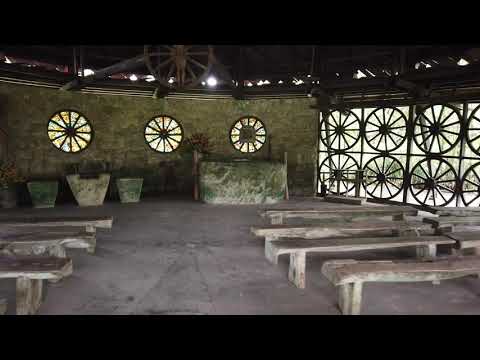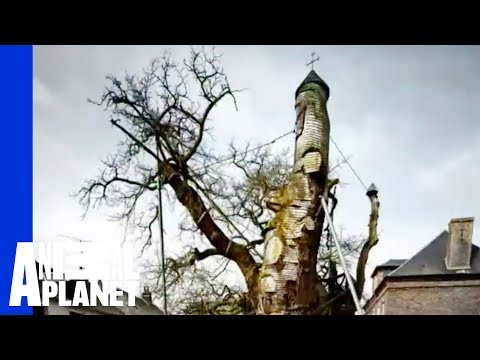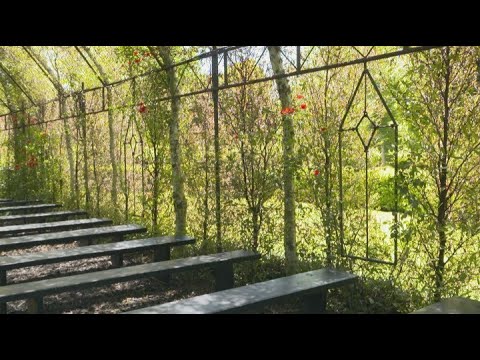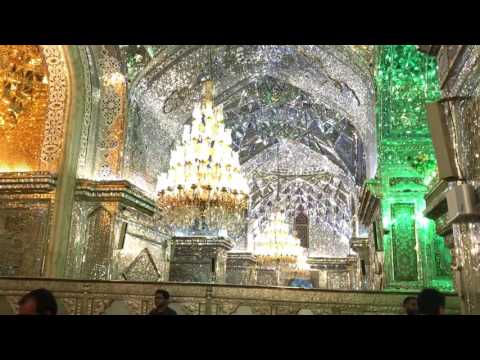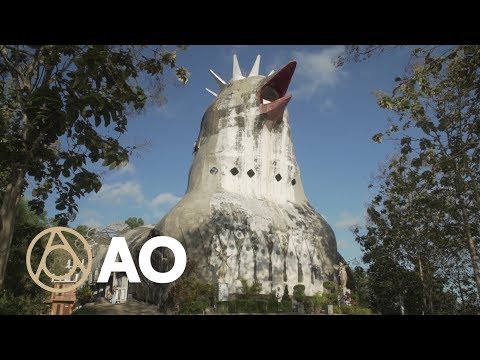Here are 10 of the most unique temples, churches, and mosques from around the world.
10 The Chapel of Cartwheels, the Philippines
The Chapel of Cartwheels is very aptly named, as it is literally a chapel made of cartwheels. The modest building is located on the Hacienda Rosalia sugar plantation in Negros Occidental, the Philippines. It was used by the plantation’s farmers and stands in contrast to the lavish Gaston Mansion nearby. The walls of the circular building consist of cartwheels stacked on top of each other, giving the structure a very open feel. A small section of the wall is made from stone and features three cartwheel windows. Broken pieces of colorful bottles have been used to give a stained-glass effect without the expense. There is even a figure of Jesus Christ being crucified on a wheel instead of a cross. The roof is distinctly lacking in cartwheels, though, and is instead modeled after a salakot, the traditional wide-brimmed hat worn by farmers in the area.[1]
9 Lotus Lake Taoist Complex, Taiwan
Lotus Lake, or Pond, is a Taoist temple complex in Kaohsiung, Taiwan, that has become a popular tourist attraction. Numerous elaborately designed temples surround a man-made body of water filled with lotus plants. The Dragon and Tiger Pagodas stand seven stories tall and feature huge dragon and tiger structures at the base of each tower, whose open mouths serve as the entrance and exit. The colorful Pei Chi Pavilion is even more visually impressive and was built to honor Xuan Wu, one of the highest-ranking deities in Taoism. Perched on top of the temple is a gigantic 23-foot (72-meter) tall statue of Xuan Wu, holding a 126-foot (38.5-meter) long sword. The other pavilions, temples, and palaces located around the lake are also spectacularly lavish, though not all of them are as bold in their designs.[2]
8 Chapel of St. Paisios, Greece
When Harry Poretsi saw that a 300-year-old oak tree was being damaged by the fires of travelers resting beneath its branches, he decided to save it by turning it into an orthodox chapel to honor St. Paisios, who had passed through the area. He lined the trunk of the tree with stone to strengthen it and added a door that leads to a small hollow containing a picture of St. Paisios, a lampada, and a candle stand—there isn’t room for much else. It looks like a chapel straight out of a classic fairy tale. Poretsi isn’t the only one to have had the idea of turning a tree into a chapel, though. An even more elaborate oak chapel is located in the French town of Allouville-Bellefosse. The now 800-year-old tree was struck by lightning during the Renaissance, and local holy men turned the hollow created into a shrine for the Virgin Mary. Known as Chêne Chapelle (“Oak Chapel”), the tree is now propped up with poles and covered in protective wooden shingles, making it look like something Tim Burton might have designed.[3]
7 The Tree Church, New Zealand
Rather than building a small chapel within the remains of a tree trunk, Barry Cox set out to grow and mold living trees into the shape of a traditional church. Cox, who had worked with trees for most of his life, states, “I walked out my back door one day and thought, ‘That space needs a church’—and so it began.” In 2011, he built the iron framework for the various different trees to grow around. He began the project purely for his own enjoyment but, by 2015, had opened the living church up to weddings. Cut Leaved Alder trees were used for the steeple roof, which let light in due to their sparse foliage, and they have flexible branches that could be trained over the temporary frame. Cooper Sheen was chosen for the walls because of its thick texture and stone color. Although it is designed to look like a church, weddings within the Tree Church do not have to be religious, making it the perfect venue for any nature-loving atheists.[4]
6 Inflatable Church, Anywhere
Michael Gill runs a Spanish-based inflatables company, and his crowning achievement is the creation of the largest inflatable church in the world. It comes in two sections, with the tower stretching 40 feet (12 meters) into the air. It is designed to look like a traditional stone church with stained-glass windows. Inside, there is a range of inflatable religious paraphernalia, including an organ, altar, pulpit, pews, cross, and even angels. Renting one of the inflatable churches for a day costs around $3,000, or they can be bought outright for around $30,000. The first one Gill made was blessed by Father Mick Elfred, giving it some level of religious qualification. “We’ve been all over the world with the church now, but I’ve just got one goal left—to meet Pope Francis and see if he’ll bless it,” Gill said in 2014. He’s still waiting for that papal blessing.[5]
5 Schneekirche, Germany
Hotels and bars made entirely out of ice have popped up all over the world, but less common are churches made out of ice. In 2011 in Mitterfirmiansreut, Germany, an ice church was built to commemorate a historical event. One hundred years earlier, in 1911, the residents of the remote Bavarian village Mitterfirmiansreut asked for their own church to be built so that they did not have to endure a 90-minute trek in the snow to the nearest church in Mauth. Their request was denied, so they created their own church entirely out of snow. Bernd Stiefvater led the 2011 project to build another temporary ice church. It cost around 135,000 and required 49,000 cubic feet (1,400 cubic meters) of snow. Ice blocks were used to give the structure integrity, and it was covered with a layer of snow before being lit up with blue lights. Catholic Church Dean Kajetan Steinbeisser blessed the temporary church, and worship services were held, but no baptisms, weddings, or masses were allowed.[6]
4 Ruriden Columbarium, Japan
The Koukokuji Buddhist Temple in Tokyo operates the Ruriden columbarium, which looks like a traditional Japanese building on the outside—complete with cured eaves and wooden sliding doors—but the inside is another story. Instead of the usual niches used to display urns, along the octagonal walls of Ruriden are 2,046 crystal Buddha statues illuminated by LEDs. Each little Buddha sits in front of an urn that holds the ashes of the dead. Watch this video on YouTube Mourners are given a smart card to light up and locate the Buddha that guards their departed loved one. The digitized multi-colored Buddhas can also put on various light shows, which while unconventional in a house of mourning, is undeniably beautiful. The ashes remain below a Buddha for 33 years before being moved to a storage location underneath the building.[7]
3 Shah Cheragh Mosque, Iran
It is not uncommon for mosques to be highly decorated, but Shah Cheragh, in the city of Shiraz, takes things to another level. The name Shah Cheragh roughly translates to “King of the Light,” which is a very fitting name, given the glittering interior looks like a mirror ball has exploded. Along with the ornately bejeweled roof and walls are numerous chandeliers and stained-glass windows, causing the space to sparkle and shine from every angle. The mosque was built around the graves of two of the sons of Mūsā al-Kādhim, one of the successors of the prophet Muhammad. The graves were supposedly discovered around AD 900 because of a mysterious light shining above them, and they became a pilgrimage site for Muslims. A traditional tomb and dome were erected, and then around 100 years later, Queen Tash Khātūn ordered the inside to be decorated with an elaborate mosaic of mirrored glass and jewels.[8]
2 Cave Churches, Turkey
Scattered throughout the Cappadocia region in Turkey are churches built directly into naturally occurring chimney-like rock formations. The most popular area to see these rock-hewn buildings is in Göreme National Park, which is home to at least 60 churches and numerous other buildings—some may not have been found yet. In 1985, the unusual area was recognized as a UNESCO World Heritage Site. During the time of the Romans, the caves were used as a sacred burial location, and then Byzantine-era monks used the area for their monasteries. Pilgrims journeyed to the caves to visit the monks and receive blessings, further enhancing the spiritual reputation of the area. The Göreme Open Air Museum contains 15 of the churches, which were likely built during the 11th century. Although they are built to blend in with the rock formations, there is impressive stonework and ornate painted decorations inside some of the structures.[9]
1 Gereja Ayam, Indonesia
In 1988, Daniel Alamsjah had a vision of a dove perched on a hill and heard a voice telling him to build a place of worship. He then came across the exact hill from his vision in a forest near Magelang, Indonesia, and set about making the dove-shaped building a reality, despite having no architectural experience. His creation is known as Gereja Ayam (“Chicken Church”), but it is not technically a church or built to look like a chicken. “Perhaps because of my Christian faith, people thought I was building a church. But it’s not a church,” Alamsjah explains. Instead, it is a prayer house for people of any faith. Watch this video on YouTube As for looking like a chicken rather than the intended dove, Wasno, a member of the construction crew, says, “It did look like a dove—in the beginning. But then we added the crown. Daniel wanted it to symbolize holiness, but people thought it was a rooster crest. So they started calling it a chicken instead of a dove.” Gereja Ayam is not the only bird-like holy building in the world, although it may be the only intended one. When viewed from the right angle, The Church by the Sea in Florida looks unintentionally, but undeniably, like a chicken. The building has circular windows that look like eyes and red roof tiles that resemble a beak.[10]
